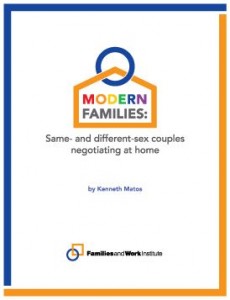NEW YORK — The chore wars aren’t new, but when hit prime-time TV shows present diverse families battling over cleaning up after meals, we know things are changing.
 But changing how much and in what ways? A new Families and Work Institute study titled Modern Families: Same- and Different-Sex Couples Negotiating at Home set out to answer that question and found:
But changing how much and in what ways? A new Families and Work Institute study titled Modern Families: Same- and Different-Sex Couples Negotiating at Home set out to answer that question and found:
While household responsibility norms are indeed changing, especially among same-sex couples, many traditional notions of work life based on gender roles still persist.
The national poll, which sampled men and women in 225 dual-earner couples and was funded by PwC, found that different-sex couples tend to take on predictable behaviors—such as having the women who earn less handle the bulk of home responsibilities—while same-sex couples did not always divvy up chores based on a fatter paycheck.
When it comes to child care responsibilities, same-sex couples tend to share more than different-sex couples.
And for all types of couples, individuals who wanted to talk about the division of household responsibilities but didn’t were much less satisfied with that division than those who did talk about it.
“In the final analysis, the defining feature of satisfaction with family responsibilities may not be who does what, but who says what they want to do,” says Kenneth Matos, Senior Director of Research at Families and Work Institute and author of the study.
Jennifer Allyn, Diversity Strategy Leader for PwC, adds, “We believe this research is important because at PwC we recognize that juggling work and home responsibilities is challenging. But as these couples clearly demonstrate, communication makes all the difference.”
Here’s an overview of the main takeaways from the findings:
- Among different-sex, dual-earner couples, gender, income and work hours are predictive of how responsibilities are divided:
- Women, lower earners and those with fewer work hours take primary responsibility for stereotypically female chores.
- Men, higher earners and those with more work hours take primary responsibility for stereotypically male chores.
- Same-sex, dual-earner couples do not consistently share responsibilities equally, but relative income and work hours are not reliable predictors for how they do divide responsibilities.
- Satisfaction in the division of household responsibilities is driven more by whether couples have a conversation about how to divide responsibilities upon moving in together than how the tasks are divided or whether the couple is same-sex or different-sex.
- A greater proportion of same-sex, dual-earner couples than different-sex couples indicate that they share routine (74% versus 38%) and sick (62% versus 32%) child care responsibilities.
“These results show that the chore wars are about more than just traditional gender roles and who does what,” explains Matos. “Efforts to end the wars should shift focus from establishing a 50/50 division of responsibilities towards making the division a deliberate decision within couples. Both spouses/partners have the responsibility to make sure no one is keeping silent.”
For more information about the study, which includes mini couple case studies, or to schedule an interview with one of Families and Work Institute’s experts, contact Eve Tahmincioglu, Senior Communications Director at FWI, at eve@familiesandwork.org. Also, you can see the full report here.











